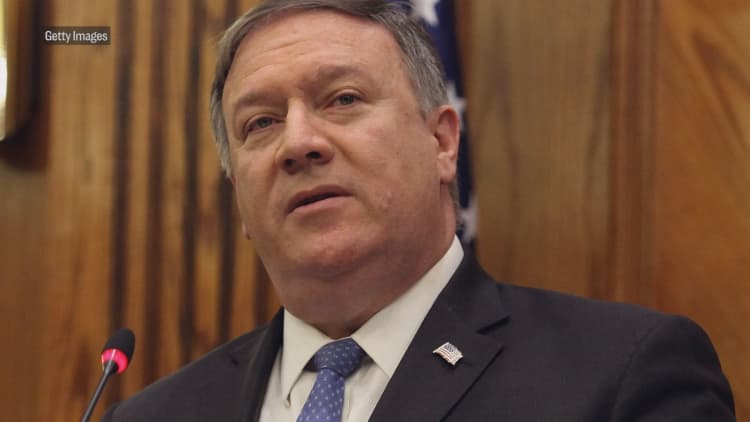Secretary of State Mike Pompeo has announced a list of a dozen demands that Iran must meet before the United States lifts punishing sanctions against the country. However, the list is a non-starter and raises the specter of a prolonged standoff in the world's busiest oil exporting region.
Pompeo articulated the list at the conservative Heritage Foundation on Monday, in his first major speech as the nation's top diplomat. The address clarified the U.S. playbook for containing Iran following President Donald Trump's announcement that he will abandon a 2015 nuclear deal with Iran and restore sanctions on the Iranian economy, including its lifeblood oil industry.
That decision has already helped boost oil prices to 3½-year highs and exacerbated frayed trade tensions with European allies, who are now developing measures to help their companies evade sanctions they helped implement just a few years ago.
I think events are moving in a more confrontational direction and by summer's end we may be back to a situation like 2012 where we worried about critical [oil market] chokepointsHelima CroftRBC Capital Markets global head of commodity strategy
The speech in its entirety was more assertive than some analysts anticipated. It made clear that the Trump administration is not merely using sanctions as a negotiating tool, but intends to pursue them to force major changes in Iran, said Henry Rome, researcher at risk consultancy Eurasia Group.
The address also suggested that Washington will not grant European companies sanctions waivers, he said. Prior to the speech, Eurasia Group said the U.S. exit "creates major risk for markets, the Middle East, and transatlantic relations" that would increase if the administration takes an aggressive stance.
However, it was the list of 12 conditions for lifting sanctions and reincorporating Iran back into the international financial order that struck many Middle East-watchers.
"The demands amount to a fundamental change in Iranian policy, if not the regime itself," Rome said in a policy brief to clients on Monday.
"The Iranian regime will almost certainly reject Pompeo's demands out of hand," said Rome.

The list calls on Iran to accept tighter restrictions on its nuclear program than those Tehran accepted after years of negotiations leading up to the 2015 accord. It also requires Iran to halt its ballistic missile program and release U.S. citizens imprisoned in the country.
Half of the demands require Iran to reverse decades of foreign policy underpinned by financial and logistical support for its regional allies and U.S.-designated terrorist groups. Those include Hezbollah in Lebanon, Shiite militias that were instrumental to defeating ISIS in Iraq, Houthi rebels in Yemen and President Bashar Assad in Syria.
Iranian President Hassan Rouhani on Monday said the demands are "not acceptable." A prolonged impasse would threaten to establish a high-stakes period marked by increased tension and risk of conflict, analysts said.
"I think events are moving in a more confrontational direction and by summer's end we may be back to a situation like 2012 where we worried about critical choke points," said Helima Croft, global head of commodity strategy at RBC Capital Markets.
Iran, OPEC's third-largest oil producer, is positioned on the shores of the Strait of Hormuz, the world's busiest maritime transport route for oil. In the past, Iran has threatened to shut the strait, which opens to the Persian Gulf, where Iranian and U.S. military vessels have clashed.
The demands are "nothing new or revolutionary," with the exception that they are being offered in exchange for a big new deal, said Mark Dubowitz, CEO of the Foundation for Defense of Democracies.
"They are a return to long-standing demands by previous administrations and foreign governments as embodied by multiple UN security council resolutions," said Dubowitz, an ardent critic of the 2015 accord who has advocated for tougher deal.
Alex Vatanka, senior fellow at the Middle East Institute, said Pompeo made a number of valid points, particularly regarding the high cost of Tehran's foreign policy. However, while that message will be welcomed by Iran's reformers, the list of demands is so bold, it raises questions about Pompeo's endgame, he said.
"That's a difficult question," said Vatanka. "What is he really trying to achieve with it? Because it's certainly not realistic for this Iranian regime to meet him anywhere close to the midway point."
Vatanka said he too believes the administration may be tilting towards a policy of regime change. In his view, that is a risky wager that depends on enough Iranians rallying around Washington, a prospect that Tehran's religious clerics could undercut with the right message.
"Certainly, this has changed the conversation," Vatanka said. "We no longer really talk about how we can force Iran to rethink its policies. We're saying if you can't rethink it, we'll do it for you. We'll bring the system down."


